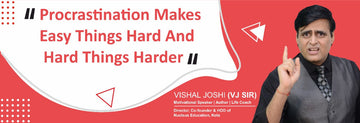Procrastination makes easy things hard, hard things harder.
Human beings have been procrastinating for centuries. Procrastination is a trap that many of us fall into. In fact, according to researcher and speaker Piers Steel , 95 percent of us procrastinate to some degree. While it may be comforting to know that you're not alone, it can be sobering to realize just how much it can hold you back. Procrastination is an active process – you choose to do something else instead of the task that you know you should be doing. In contrast, laziness suggests apathy, inactivity and an unwillingness to act.
But giving in to this impulse can have serious consequences. For example, even minor episodes of procrastination can make us feel guilty or ashamed. It can lead to reduced productivity and cause us to miss out on achieving our goals. If we procrastinate over a long period of time, we can become demotivated and disillusioned with our work, which can lead to depression and even job loss, in extreme cases.
You may also be procrastinating if you:
- Fill your day with low-priority tasks.
- Leave an item on your To-Do list for a long time, even though it's important.
- Read emails several times over without making a decision on what to do with them.
- Start a high-priority task and then go off to make a coffee.
Fill your time with unimportant tasks that other people ask you to do, instead of getting on with the important tasks already on your list.
Overcoming procrastination is difficult, especially if you’re a passive procrastinator. Some ways to help you to limit your procrastinating is to create a list of priorities. Determine which task needs to be completed first based on deadlines and the importance of the task. If it’s more important than anything else you could do at the time.






